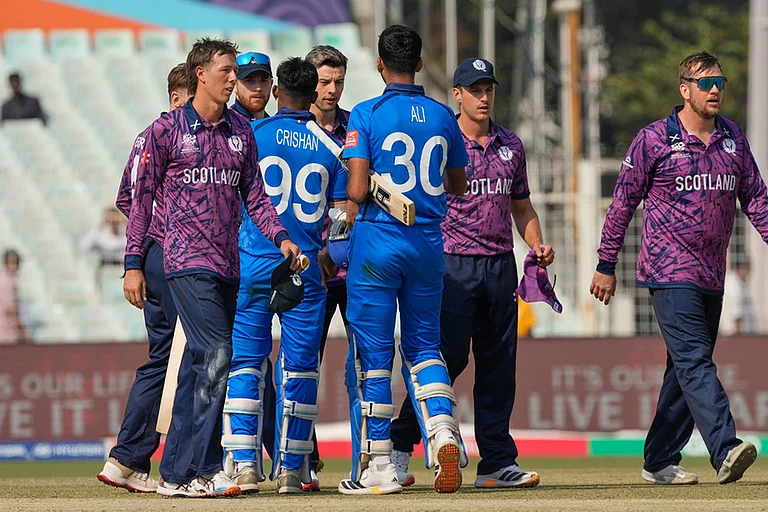There is no such thing called honourable defeat. But these days in cricket,it is believed that Australians are the best team on this planet and eventslike the World Cup are staged to reconfirm this conclusion. So India'sdefeat to Australia in the final of the 2003 World Cup at Johannesburg'sWanderers can be described as man's defeat to machine or a valiant shot atthe impossible or other consolations in this manner of speaking.
There is another way of deriving happiness. This Indian team reached thevery last stage of the competition notching eight straight wins in theprocess, a feat it has achieved only once before in its history. It lostonly twice, only to Australia on both the occasions. Language can be usedin many other ways in this manner to describe the loss efficiently but thenat some point in the funeral, truth has to be spoken. There is sadness inIndia. It's not alright to lose. It cannot be accepted as a mere inevitability in a supernatural scheme of things. It was human error. So questionshave to be asked.
Did captain Ganguly put Australia into bat because they feared Brett Lee inthe morning? Ganguly defended his decision to bowl first saying he was onlybacking his bowlers. "There was something in the pitch for the bowlers."But Ponting himself said that had he won the toss he would have batted. Butthen, isn't it de riguer for every captain who loses the toss to claim thathe would have preferred to do just the thing that the opposing captain hasforced on him? Wasn't it true that the ball, when it was dropped at theright length, did things that flummoxed the batsmen?
It was all true. But everything that had got India to the final seemed onthis day to turn itself inside out and end up as an apologetic belch. Thepace attack, the best that Indian cricket has ever seen, suddenly looked tobe suffering from serious Abid Ali-Solkar nostalgia. Even if, let usassume, there was no assistance to the bowlers, there was no Indian spellthat looked lethal. At the most, Nehra and Harbhajan were effective in thebeginning. For the most part of the game, Indian bowlers seemed to haveforgotten where to pitch the cricket ball. In the slog overs, Srinath andZaheer bowled full toss after full toss after full toss (the crowningignominy is, of course, seeing a slower ball turning into a full toss, tobe hit -- to be shrugged away -- to the boundary, or over it).
Why did the bowlers bowl the way they did? Right from the first over whenZaheer Khan conceded 15 runs without making the openers work for them, thefuneral had begun. There was not a single phase in the first 50 overs thatwere bowled on March 23 when it looked like the Australians may havethought of giving some respect to the Indians. Eighty runs were scored inthe first 10. One hundred and forty three scored in the last 15. Twentyfour fours were hit. Ten sixes. And 37 extras. All in exchange for two wickets. The only explanation is that the Indians were mentally disturbed bythe occasion, something that Ganguly admits, though grudgingly.
Ponting told journalists after winning the World Cup that there was nothingin the body language of the Indians that made him think they believed theycould win. But then, history is written by the victorious. Body language?Till the semi-final in the 1999 World Cup, Steve Waugh was supposed to havethe second worst body language in the world, after Mohammad Azharuddin. Andby the way, Sachin Tendulkar bites his nails like a maniac, and when he iswearing batting gloves, keeps checking if his family jewels are in place.Body language? Give me a big break.
All these explanations and post-rationalisations and kreegah bundolos ofthe victors are so much bovine faeces. India lost a chance to seriouslyquestion Australia's position as not just the best team in the world butalso a side that is believed to have created a wide gap between itself andthe rest of the population. India had that chance. And among all thecricketing nations of the world, only India could have slipped a littlethin edge under Ozymandias' feet. We had that chance. We goofed it up. Wehave to live with this fact. A nation that is most crazy about cricket,that truly has nothing much but this sport to insert some pride intoitself, has to accept to live in these times under the shadow of asuperpower.
Ponting told journalists, perhaps in a way that Oscar Wilde would havedescribed his team: "It's not that we think we are ahead of the others.It's just the way we play." But he did believe that India and Australiawere the best two teams in the World Cup and that these were teams "thatdeserved to be in the final". There cannot be a statistical complaintagainst Ponting when he said that it was "a comprehensive victory againstthe second best team in the World Cup". A win by 125 runs fits thatdescription, but till about the 25th over it could have been called a closematch, or, at a more realistic level, a great fightback. India was 154 for4 in 25 overs. Australia during that stage was 155 for 2. For several oversafter that, if the fall of wickets were not taken into account, themathematics was hopeless. Though when the end came in a hurry, there was nosurprise, it's difficult not to ponder over just how close it could allhave been if Australia had scored just over 300 and not chosen the day ofthe final to score their highest total ever.
Everything that worked for India in all those matches we played to set upthis match, this match for the crown, suddenly hiccuped and scurried away.The bowlers failed, though not Nehra, and not that reviled young man calledDinesh Mongia. But then the two young men, Kaif and Yuvraj, the two men whoembody this brilliant team more than Ganguly or Sachin, were overawed bythe occasion. They failed. The bulwark of India's World Cup campaigncollapsed.
But should we weep?
No.
It's a queer fact of Indian cricket that when, even when, the team fails,individuals rise to the very top of the heap. Sitting next to Gangulyduring the post final press conference was Sachin Tendulkar who wasdeclared Man of the Tournament. It was an honour he received even beforethe teams went out to play the final. He said the right things at the pressconference like how, "we play as a team", how he would have been happier ifhe had received the honour along with the World Cup. When he left after thefifth ball of Australia's first over, attempting a pull off McGrath, hopedied. But Sehwag played his best knock in the World Cup to furiously bringmatters at least to a point where Indian supporters found their voicesback.
Ganguly lived constantly on the edge having no other option. When it beganto rain during the 17th over Indian fans urged the volunteers who hadcrouched near the covers to go save the pitch.
When the covers did come on at the end of the 17th over, there was a hugeroar and general excitement. But the 23-minute loss of play didn't subtracta single over from India's ordeal. If it had rained heavily and India hadabout 30 overs to reach the target, Duckworth-Lewis would have favouredIndia slightly. But it was a day when even the Australians had to provethat there is something called mind in physical sports. One day before thefinal, Ponting had said that on big occasions his team "tries to reachanother level".
History is always written by the victorious. But that doesn't mean it'strue. When you look back at World Cup 2003, remember Sachin Tendulkarlifting Shoaib Akhtar for a six over third man, remember Ashish Nehrabowling those incredible deliveries that no sane batsman can play, rememberKaif running out Nick Knight so fast that no photographer on earth couldtake that picture, remember Saurav Ganguly snarling "Bhat!" at Yuvraj whenhe wanted to take a second run which wasn't there, and then going up to himand hugging him. Remember Javagal Srinath, the oldest fast bowler in theworld, scaring the hell out of the batsmen. Remember, above all, RahulDravid, the man who played always only for his team, a true cricketer and atrue man.
And screw history as written by the victorious.
With Manu Joseph in Johannesburg


























